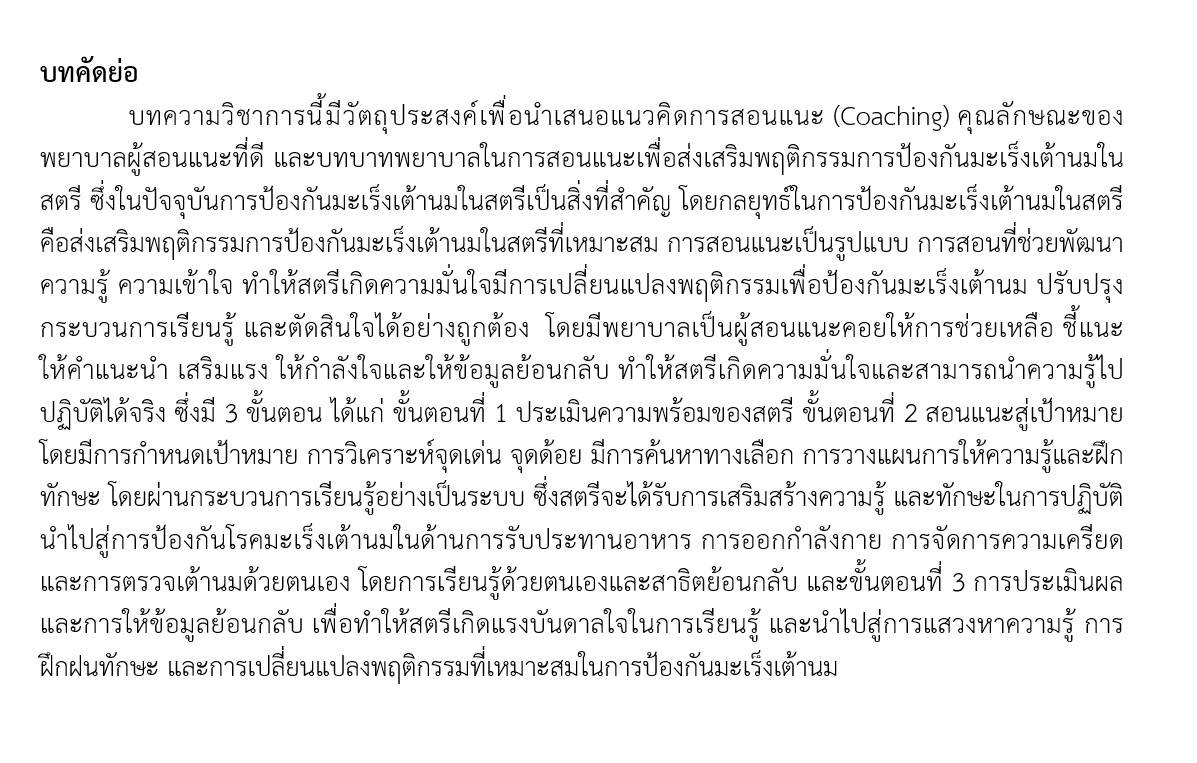บทบาทพยาบาลในการสอนแนะเพื่อส่งเสริมพฤติกรรมการป้องกันมะเร็งเต้านมในสตรี
คำสำคัญ:
การสอนแนะ, พฤติกรรมการป้องกันมะเร็งเต้านม, สตรีบทคัดย่อ
บทความวิชาการนี้มีวัตถุประสงค์เพื่อนำเสนอแนวคิดการสอนแนะ (Coaching) คุณลักษณะของพยาบาลผู้สอนแนะที่ดี และบทบาทพยาบาลในการสอนแนะเพื่อส่งเสริมพฤติกรรมการป้องกันมะเร็งเต้านมในสตรี ซึ่งในปัจจุบันการป้องกันมะเร็งเต้านมในสตรีเป็นสิ่งที่สำคัญ โดยกลยุทธ์ในการป้องกันมะเร็งเต้านมในสตรีคือส่งเสริมพฤติกรรมการป้องกันมะเร็งเต้านมในสตรีที่เหมาะสม การสอนแนะเป็นรูปแบบ การสอนที่ช่วยพัฒนาความรู้ ความเข้าใจ ทำให้สตรีเกิดความมั่นใจมีการเปลี่ยนแปลงพฤติกรรมเพื่อป้องกันมะเร็งเต้านม ปรับปรุงกระบวนการเรียนรู้ และตัดสินใจได้อย่างถูกต้อง โดยมีพยาบาลเป็นผู้สอนแนะคอยให้การช่วยเหลือ ชี้แนะ ให้คำแนะนำ เสริมแรง ให้กำลังใจและให้ข้อมูลย้อนกลับ ทำให้สตรีเกิดความมั่นใจและสามารถนำความรู้ไปปฏิบัติได้จริง ซึ่งมี 3 ขั้นตอน ได้แก่ ขั้นตอนที่ 1 ประเมินความพร้อมของสตรี ขั้นตอนที่ 2 สอนแนะสู่เป้าหมาย โดยมีการกำหนดเป้าหมาย การวิเคราะห์จุดเด่น จุดด้อย มีการค้นหาทางเลือก การวางแผนการให้ความรู้และฝึกทักษะ โดยผ่านกระบวนการเรียนรู้อย่างเป็นระบบ ซึ่งสตรีจะได้รับการเสริมสร้างความรู้ และทักษะในการปฏิบัตินำไปสู่การป้องกันโรคมะเร็งเต้านมในด้านการรับประทานอาหาร การออกกำลังกาย การจัดการความเครียด และการตรวจเต้านมด้วยตนเอง โดยการเรียนรู้ด้วยตนเองและสาธิตย้อนกลับ และขั้นตอนที่ 3 การประเมินผลและการให้ข้อมูลย้อนกลับ เพื่อทำให้สตรีเกิดแรงบันดาลใจในการเรียนรู้ และนำไปสู่การแสวงหาความรู้ การฝึกฝนทักษะ และการเปลี่ยนแปลงพฤติกรรมที่เหมาะสมในการป้องกันมะเร็งเต้านม
เอกสารอ้างอิง
Arunjit, S., & Navicharern, R. (2019). The Effect of Coaching Program on Breast Cancer-Preventive Behaviors in Women at Risk. Journal of the Royal Thai Army Nurses. 20(2), 289-297. (in Thai)
Cancer Research UK. (2014). Diet and Breast Cancer. Retrieved 26 July, 2015, from http://www.cancerresearchuk.org/about-cancer/type/breastcancer/about/risks/diet-and breast cancer.
Catsburg, C., Miller, A. B., & Rohan, T. (2014). Adherence to Cancer Prevention Guidelines and Risk of Breast Cancer. International Journal of Cancer, 135(10), 2444-2452.
Chomchuen, T., Surath, S., & Mukchanan, B. (2016). Predicting Factors of Breast Self-Examination Effectiveness of Health Volunteers in Chiang Rai Province. Journal of Community Development and Life Quality, 4(3), 389-400. (in Thai)
Chotsangsakorn, R., Thanasilp, S., & Pudtong, N. (2019). Predicting Factors of Breast Cancer Screening Behaviors among Menopausal Women. Kuakarun Journal of Nursing, 26(2), 107-120. (in Thai)
Denieffe, S., Cowman, S., & Gooney, M. (2014). Symptoms, Clusters and Quality of Life Pripr to Surgery for Breast Cancer. Clin Nurs, 23(17-18), 2491-2502.
Jouybari, L., Naz, M. S. G., Sanagoo, A., Kiani, F., Sayehmiri, F., Sayehmiri, K., et al. (2018). Toxic Elements as Biomarkers for Breast Cancer: a Meta-Analysis Study. Cancer Management and Research and Research, 10, 69-79.
Eaton, J., & Johnson, R. (2000). Coaching Successfully. United States: Dorling Kiddersley Publishing.
Janusek, W. L., Tell, D., & Mathews, L. H. (2019). Mindfulness Based Stress Reduction Providespsychological Benefit and Restores Immune Function of Women Newly Diagnosed with Breast Cancer: A Randomized Trial with Active Control. Brain, Behavior, & Community, 80, 358-373.
Markdum, J., Thanasilp, S., & Pudtong, N. (2017). The Effects of a Shoulder Exercise Program Combined With Qigong on Ability to Shoulder Function of Breast Cancer Patients After Mastectomy. Songklanagarind Journal of Nursing, 37(1), 38-52. (in Thai)
National Health Security Office. (2011). Strategic Framework for Health Promotion and Disease Prevention at the National Level 2011-2015. Bangkok: Bureau of Policy and Strategy Ministry of Health. (in Thai)
National Breast and Ovarian Cancer Center. (2010). Breast Cancer Risk Factors a Review of Evidence July 2009. New South Wales: Crown Street Hill.
National Cancer Institute Department of Medical Services Ministry of Public Health Thailand (2019). Hospital-Based Cancer Registry. Bangkok: Information Technology Division National Cancer Institute. (in Thai)
National Cancer Institute Department of Medical Services Ministry of Public Health Thailand. (2018). Hospital-Based Cancer Registry. Bangkok: Information Technology Division National Cancer Institute. (in Thai)
Nayeri, N. D., Bakhshi, F., Khosravi, A., & Najafi, Z. (2020). The Effect of Complementary and Alternative Medicines on Quality of Life in Patients with Breast Cancer: A Systematic Review. Indian Journal of Palliative Care, 26, 95-104.
Nonthapha, S., & Navicharern, R. (2017). Factors Related to Protection Motivation Theory and Breast Cancer Prevention Behavior among Teachers in Provincial School, Central Region. Kuakarun Journal of Nursing, 24(2), 23-35. (in Thai)
Petsirasan, R., & Noonill, N. (2010). Effectiveness of a Promoting Self-Breast Examination Program for adult Women. Rama Nurs J, 16(1), 54-69. (in Thai)
Pumduang, J., Phrakrukositwatthananukul, Panasri, S., & Intongpan, P. (2019). Enhancing the Potentiality of Learning Behavior by Using Anapanasati a Case Study of Students Bhavanabhodigun Vocational College Koh Samui Surat Thani. Journal of Social Science and Cultural, 3(2), 41-53. (in Thai)
Rukyou, S., Lueboonthavatcha, O., & Navicharern, R. (2015). The Effect of Coaching Program on Caregivers’ Agency in Urinary Catheterized Care for Spinal Cord Injured Patients. Thai Journal of Cardio-Thoracic Nursing, 26(1), 45-56. (in Thai)
Saksiri, W. (2015). Knowledge, Attitude about Breast Self-Examination of Women Aged 30 Yearsand Older in the Responsibilities of the Health Promotion Hospitals Ban Don Kha. (in Thai)
Shaw, N. K., Kerman, K., & Fitness, J. (2015). Dating Concerns among Women with Breastcancer or with Genetic Breast Cancer Susceptibility: A Review and Meta-Synthesis. Health Psychol Rev, 9(4), 5-18.
Soivong, P., Sawasdisingha, P., Tanvattanagul, C., Fukul, A., Kaewinta, Y., Puangsaijai, S., et al. (2017). Efficacy of a Self-Management Program in Breast Cancer Patients. Thai Journal of Nursing Council, 32(4), 5-18. (in Thai)
Sirikunwiwat, J., & Navicharern, R. (2019). The Effect of the Coaching Program in Health Behaviors Modification on HbA1C of Persons with Pre-Diabetes. Journal of Nursing Science Chulalongkorn University, 31(2), 10-22. (in Thai)
Tritipsombut, J. (2019). The Relationships Between Knowledge, Health Perception and Breast Cancer Preventive Behaviors in Risk Group Women. The Office of Disease Prevention and Control 7 Khon Kaen, 26(3), 13-24.
Vahdaninia, M., Omidvari, S., & Montazeri, A. (2010). What do Predict Anxiety and Depression in Beast Cancer Patients? A Follow-Up Study. Soc Psychiatry Psychiatr Epidemiol, 45(3), 355-361.
Warathornpibun, T. (2015). Consumption Behavior: Consumerism Food and Health-Conscious Food. Panyapiwat Journal 2, 255-264. (in Thai)
Wang, Q., & Zhou, W. (2020). Roles and Molecular Mechanisms of Physical Exercise in Cancerprevention and Treatment. Journal of Sport and Health Science, 2020, 1-10. doi.org/10.1016/j.jshs.2020.07.008
World Health Organization. (2013). Cancer Prevention. Retrieved May 24, 2014, from http://www.who.int/cancer/prevention/en/.
World Health Organization. (2014). Breast Cancer. Retrieved August 2, 2016, from http://www.who.int/cancer/prevention/diagnosisscreening/prevention/ breast cancer/en/.

ดาวน์โหลด
เผยแพร่แล้ว
ฉบับ
ประเภทบทความ
สัญญาอนุญาต
1. บทความหรือข้อคิดเห็นใด ๆ ที่ปรากฏในวารสารเครือข่าย วิทยาลัยพยาบาลและการสาธารณสุขภาคใต้ ที่เป็นวรรณกรรมของผู้เขียน บรรณาธิการหรือเครือข่ายวิทยาลัยพยาบาลและวิทยาลัยการสาธารณสุขภาคใต้ ไม่จำเป็นต้องเห็นด้วย
2. บทความที่ได้รับการตีพิมพ์ถือเป็นลิขสิทธิ์ของ วารสารเครือข่ายวิทยาลัยพยาบาลและการสาธารณสุขภาคใต้







